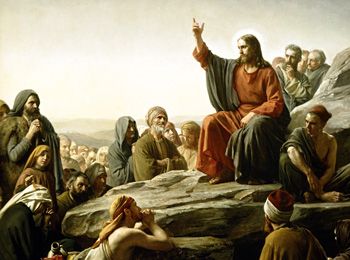The Continuing Unity of the Church Part 3 of 3
by John Lowe
(Laurens SC, USA)

“Joses, who by the apostles was surnamed, Barnabas . . . This is the first mention of “Barnabas” in the Bible. The giving of surnames was widely practiced in that day, and the surname usually expressed the character of the person to whom it was given. “Barnabas” was a name taken from two Syriac words, the first word meaning “son” and the second word meaning “prophecy.” Thus Barnabas means “the son of prophecy.”The Greek word that is translated here as “consolation” means literally “exhortation, entreaty, petition, or advocacy.” We find this applied to Barnabas in Acts 11.22, 23, where the church in Jerusalem sent him to Antioch where “when he came, and had seen the grace of God, was glad, and EXHORTED them all, that with purpose of heart they would cleave to the Lord.” Was he given this nickname because he was a great comfort and consolation to the Jewish-Christian community through the gift of money obtained from the sale of his property?
“A Levite, and of the country of Cyprus.” The entire tribe of Levi was set apart for the service of the temple and the Jewish religion. Cypress was one of the largest Islands in the Mediterranean Sea. Historians tell us that there were many Jews living there. We know from Acts 13.4 that Paul and Cyrus were sent there by the Holy Ghost when Paul took his first missionary journey. Then in Acts 15.39-41 we read that Barnabas again went to Cyprus to preach, taking Mark with him while Paul and Silas “went through Syria and Cilicia.” He is generally associated with the apostle Paul as a traveling companion on Paul’s first missionary journey. The two traveled together in fellowship and harmony until a feud came between them concerning John Mark. It was then that Barnabas took young Mark and sailed for Cyprus and Paul traveled with Silas on his second missionary journey. For a considerable period, until Paul took the leadership, he must have been the most prominent figure in Jewish-Christian circles.
Barnabas was a landowner—to what extent we are not told; but in verse 37 we are told that he,“Having land, sold it, and brought the money, and laid it at the apostles' feet.” Barnabas gave up all he had for the sake of the ministry in the name of the Lord Jesus Christ. When Jesus became the Savior of his soul, He also became the lord of his life. We need to realize as did these early Christians in Jerusalem, that true possessions are in Heaven. Our citizenship is in Heaven, and our Savior is there too. We are members of His body, and we are seated in heavenly places with Him. The kind of selfless living which is pictured here could be carried out for only a short while because of the spiritual condition of the Church. It is nonsense to say that we should put this into effect today. If we tried it, we would have utter chaos. Why? Because there must first be the same high spiritual level, and we don’t have that today. Let’s be honest and face up to it. We need to come into a closer relationship with the Lord Jesus Christ.
After reading this verse the question may be asked, “How could a Levite own property as Barnabas did? I thought Levites were prohibited from owning property.” This prohibition is found in Numbers 18.20, 24: “Then the Lord said to Aaron: "You shall have NO INHERITANCE in their land, nor shall you have any portion among them; I am your portion and your inheritance among the children of Israel. . . For the tithes of the children of Israel, which they offer up as a heave offering to the Lord, I have given to the Levites as an inheritance; therefore I have said to them, 'AMONG THE CHILDREN OF ISRAEL THEY SHALL HAVE NO INHERITANCE.’” The answer may be that whereas the Levites were not to own land in Israel, they could own land elsewhere. Apparently, Barnabas, being from the island of Cyprus, owned land there. It is also possible that his wife owned land in Israel and that together they sold it. Most probably the restriction in Numbers was no longer observed, as seen in the case of Jeremiah (Jer. 32.6-15).
It is true that these early Christians did not have the full revelation. They did not have the New Testament; the completed Word of God; but what they knew of the Lord Jesus Christ, his bodily resurrection and his place at the right hand of God the Father, was enough to cause them to lose sight of earthly things and fix their eyes on things eternal. The Holy Spirit made Jesus so real to them that through His power they were able to bear witness to the truth—boldly and with conviction. The fact that these Christians believed in the bodily resurrection separated them from all other religions of their day, and it was because of this belief that“great grace was upon them all.”
That same grace should cause us to cling lightly to the things of this earth, and in these days when we know the Lord’s Second Coming is even now at the door we should set our affections on things above, and pray with John the Beloved, “EVEN SO, COME, LORD JESUS!”
No content on preachology.com may be printed or
copied to any other site without permission.
|
The Preaching Ezine Subscribe to my free newsletter for monthly sermons and get a free book right now. Just follow the link above and get the details! |
|
Sermon Supply Ministry
Be ready for Sunday…before Saturday night! |
|
Manna Seminary
Did you ever want to start or finish your Ministry Training? |
|
YOUR PAGES: by sharing YOUR great sermons! by sharing YOUR great poems! |



